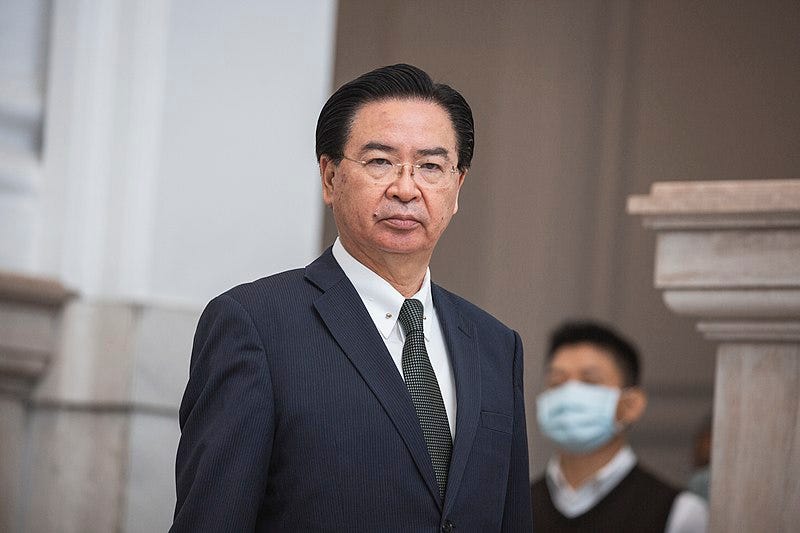Amid Future Taiwan War Fears, What's Behind the Philippines-Taiwan Security Ties Talk?
Plus China's information manipulation in Southeast Asia; Vietnam's multidirectional foreign policy and more.
Welcome back to ASEAN Wonk BulletBrief! For this edition of this weekly product, we’re looking at:
The geopolitical context behind recent chatter on security ties between Taiwan and the Philippines, including Manila’s evolving strategic environment and its role in wider minilateral networking.
Mapping of key regional developments, including the visit of a U.S. aircraft carrier to Vietnam (ICYMI, see our separate take here); a new Brunei-Japan defense dialogue; Cambodia’s pre-election mystery drone controversy and more;
Evolving trends including on China’s disinformation efforts; the shadow of militancy in Indonesia ahead of the 2024 elections; and the opportunities and challenges in ongoing energy transitions;
Tracking and data-driven analysis of industry developments such as Malaysia’s approach to media platforms on content moderation; the state of Myanmar’s economy and Thailand’s evolving telecommunications environment;
And more!
WonkCount: 1224 words (~ 6 minutes reading time)
Vietnam’s US-China Balance; New Brunei-Japan Defense Dialogue; Cambodia’s Mystery Drones & More

Amid Future Taiwan War Fears, What's Behind the New Philippines-Taiwan Security Ties Talk?

What’s Behind It
Taiwan’s foreign minister Joseph Wu indicated that Taiwan and the Philippines could explore opportunities in security cooperation. Wu told a Philippine media outlet that security cooperation should be “one area that we should think about” amid the promise of ties between the Philippines and Taiwan under President Ferdinand Marcos Jr.
The comments come as the Philippines role in a Taiwan contingency has been in the headlines over the past few months (see table above). While treading carefully given Beijing’s sensitivity to anything surrounding Taiwan, Marcos has nonetheless pointed to the proximity of Taiwan to the Philippines and has publicly acknowledged the importance of U.S. access to Philippine military sites in the event that China attacked Taiwan. Other developments have also spotlighted ties, be it the May visit of Philippine Senator Risa Hontiveros to Taiwan (see picture below) — who has been vocal about her support for Taipei — or the comments by China’s ambassador to the Philippines, later clarified, which seemed to suggest that stronger US-Philippine security cooperation could put around 150,000 overseas Filipino workers in Taiwan at risk.

Why It Matters
The Philippines would have an important role to play in a Taiwan contingency. Beyond the outlook of any single administration in Manila, the Philippines is just one of five U.S. treaty allies in Asia, is a rare place that currently supports a U.S. rotational presence and lies within the so-called first island chain.
More generally, the Philippines is among the Southeast Asian countries that have been key as Taipei pushes for more engagement through initiatives like the New Southbound Policy (NSP) under President Tsai Ing-wen. Though the NSP has gone through adjustments over time and has not been without its challenges alongside progress touted in aggregate metrics and select sectoral areas like health, culture or education, the Philippines had been seen as being among the gateways for Taiwan’s approach in the region, and initial NSP gains had included ones like a renewed bilateral investment agreement with Manila.
What Lies Ahead
Looking ahead, what progress Taipei and Manila can achieve in their ties will be notable to monitor. China typically balks at even routine areas of cooperation Wu cited such as disaster relief or coast guard cooperation, as he himself noted with the case of when Super Typhoon Yolanda hit the Philippines in 2013, where Chinese pressure led Taiwan to stop its relief efforts.
More generally, how Marcos manages evolving ties with the United States and China will also impact how it views its ties with Taiwan amid political flux. Despite quick gains in the U.S.-Philippine alliance since Marcos has come to power last year, China is no stranger to recalibrating its mix of coercive and collaborative measures to try and shape Manila’s behavior, and complicate the recent inroads in the U.S.-Philippine alliance. Both Taiwan and the United States will have elections in 2024.
China’s Information Manipulation in Southeast Asia; Transboundary Haze Fears; Militancy in Indonesia
“A new strategy encouraging Malaysians to study in the PRC, as well as latent skepticism toward the West…may shift Malaysian Chinese community perceptions in more pro-PRC directions,” argues the Malaysia section of a report on countering PRC information manipulation by the International Republican Institute. The chapter notes that even though the PRC is often not directly interfering in the information sphere, it nonetheless adopts a more indirect, long-term approach that taps into dependencies created by business ties, relationships, exchange opportunities and media advertising. The report also includes two other Southeast Asia chapters on the Philippines and Thailand (link).
“There is a danger that severe transboundary haze will impact us,” warns the latest iteration of the Haze Outlook published by the Singapore Institute of International Affairs think tank on the risk of haze for Indonesia, Malaysia and Singapore. This is the first time in the report’s five years that it has designated the risk rating as “red” in its traffic light rating system, in part due to the prospect of severe dry weather that may result from the El Niño phenomenon (link).
“Militant groups in Poso remain a threat, even if they are greatly weakened…As elections approach in 2024, it is important to keep a close watch…to ensure that militants do not exploit local rivalries,” notes a report by the Institute for Policy Analysis and Conflict on the state of what had been a site of Christian-Muslim conflict and Islamic extremism in Indonesia. The report suggests a less rosy picture (see Table below from the report on the concentration of offenders affiliated with Mujahidin Indonesia Timur or MIT for example) than perceived government thinking that Poso may be relatively safe, due to a mix of factors including lingering communal tensions, flawed rehabilitation and reintegration programs, the concentration of ex-prisoners and the risk of penetration of schools and mosques (link).











